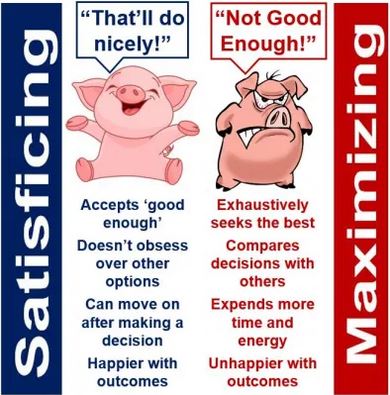Finish What You Start
Action Will Destroy Your Procrastination
4 Key Tips To Help You Finish What You Start

Why Do You Fail To Finish What You Start?
So why do you fail to finish what you start? Or in my case, why do I fail to even get started?
There is a wealth of information out there about how to avoid procrastination, how to get started and how to finish what you start and yet for so many of us this area is huge problem.
A good friend of mine is a successful clinical psychologist and academic with an applied doctorate, two masters and a graduate degree under her belt. She has extensive interests outside of her professional pursuits, including the Chair of a medium sized charity and acting as mentor to a number of up and coming doctoral students. As you have gathered she is a highly accomplished and successful person!
And yet... as she was sharing with me recently - every time that she has a new project to commence or a report to write or a clinical assessment to complete she procrastinates and leaves it to the last minute - often staying up until the early hours in order to complete the task. In fact she said that the only way she can complete these things is by putting herself under so much time pressure that she just has to get on and do it.
Now it's my turn to share the spotlight of shame! This very article that you are reading now sat in a draft template on my website's server for about 4 months whilst I wrote about 30 other articles. Why?
I know of a number of other intelligent capable people who share the same behaviour. Why do we behave like this?
Ego is the enemy
Ryan Holiday popularized that phrase with a book of the same name:"Ego is the enemy" he says: "because it prefers talking over doing".
Peter Hollins, author of "Finish What You Start" says that:
"The ego doesn't want to admit weakness or risk failure so it puts up a 'perfectionism' roadblock by raising the finishing requirements.
With the
finishing requirements seemingly out of reach, you lose interest and fail to
finish what you started."
You're hardwired not to bother finishing
There is one further reason why you fail to finish what you start and that is that the human brain did not evolve for a life of delayed gratification it is hardwired for immediate gratification.
This causes a constant conflict because it assesses potential rewards by ascribing a higher value to the present and a discount to the future.
In practical terms this means that we would rather sit around eating biscuits and sipping coffee rather than take the next step in finishing what we have started - or in some cases even getting started in the first place!
So the cards are stacked against us.
4 Tips To Finish What You Start
Here are 4 key tips to finish what you start, and all based on extensive personal experience.
You may find some of these tips counter-intuitive, but believe me they do work and are effective.
[1] Have a quitting strategy in place right up front

Quitting just because you are feeling bored, stuck or uninspired is usually a bad idea because it is usually based on subjective and emotional factors.
In my experience here are 2 powerful reasons to abort the project and not finish what you started:
- Errors of judgement - There are occasions when you have
made a commitment
to a new initiative, project or job [or even a new relationship] and you
realise very early
on that that you have made a serious error of judgement and that this is
absolutely not right for you. If you find yourself in this position -
then do the right thing for all concerned, admit your mistake and exit
from the situation or abandon the initiative.
- For something better and more aligned to your long term interest. Quitting for the long term is usually the better option. Life is short and it is pointless wasting time. Free yourself up to focus on something that is much more beneficial to your long term interests.
The beauty of having this strategy in place is that you know you can bail out if you need too. There is no need for lots of angst and time wasting.
But, if neither of these criteria apply, then move on to the next key tip and finish what you start.
[2] Have a delivery mentality

Near enough can be good enough to make the initial delivery.
This process is known as satisficing.
Always make the delivery date.
Rather than driving yourself crazy trying to finish what you started to a level of perfection, just deliver it as soon as your project or initiative reaches a basic acceptable level or when you have reached the due date for finishing/delivering it.
"Delivering it" is defined by the parameters of what you are doing. In my case, with this article, I will have reached that initial delivery point as soon as I have structured this web page, added the content and formatted it. I will then post the page live online on this site.
Adopt an iterative approach.
BUT, here's the secret sauce - after you have delivered you can go back multiple times and modify, improve and enhance your project.
In subsequent days after I have posted this article I will go back and make improvements - usually several times.
There is a hidden benefit in this iterative approach - an early delivery or release of the initiative creates an opportunity to evaluate it in a live or real time environment - and especially from a reader's [or user's] perspective. This leads to better improvements and a more optimized "end product".
Let me give you a real-life example of this on a much larger scale.
Some years ago I was working with a programme director on a very large IT project. There were continual delays on getting each phase of the software released and delivered by the developers, and key project milestones were being missed.
We changed the delivery protocol with the developers and insisted they always deliver on time. The project milestones had to be hit.
As you can imagine, the developers [these were 3 large sub-contracting companies] went crazy and said they could not meet these deadlines and deliver to full specification.
We told them to deliver what was ready by the due date - regardless of the level of completion - and then to issue subsequent updated releases over the following week or two until the original delivery was at full spec.
Improve the end user/customer's experience
This also gave the business users early visibility of the software as it was being built and subsequently led to higher, and earlier, levels of user acceptance.
Following this change of procedure we ensured that all subsequent 181 milestones were hit [not one was missed] over the following 9 months.
The system was delivered on time and in budget and passed all user acceptance testing with flying colours!
Resource:
The ETTO Principle - Why Near Enough Can Be Good Enough
[3] Have a process for getting started

You need to have a predetermined simple process to help you get started and to help you get better at getting started.
This isn't rocket science, but it never fails to amaze me how many otherwise bright people I have known who don't have this.
Here are 3 simple and proven steps:
- Start very small - At the getting started [again] stage, just doing it is what matters and that is far more important than how much you do. For example, a few years ago I wanted to go the gym regularly so I set myself the task of just turning up at the gym for 10 mins several times a week. Then I would leave. Over the following weeks I increased the time spent at the gym as the habit of doing it got stronger.
- Set up a "getting started" habit with "The 2 Minute Rule" In "How to Stop Procrastinating With the “2-Minute Rule” James Clear says: "When you start a new habit, it should take less than two minutes to do. " The idea is to make your habits as easy as possible to start. Anyone can meditate for one minute, read one page, or put one item of clothing away. As with the "Start Very Small" approach, this is a powerful strategy because once you’ve started doing the right thing, it is much easier to continue doing it.
- Always make the delivery - See above! This approach is all about "the art of showing up on time" and the power of consistency.
[4] Have your ego as your ally

We noted above how Ryan Holiday described ego as the enemy.
I recommend that you spin that around and get your ego onboard as your ally.
One of the biggest problems for your ego is boredom and not having enough to do. You may recall the old wives saying that "the devil finds work for idle hands to do" - well this is especially true for the ego.
My final suggestion for how to finish what you start is to get your ego involved - give it something useful to do. I recommend 2 stages:
- Focus your ego on the process - especially the getting started process - and not the goal. Shift your ego away from worrying about the big stuff and focus it on the daily routine that will help you finish what you start.
- Get your ego engaged in measuring the small incremental steps in this process. The act of measurement takes an unknown quantity and makes it known. Rapid feedback satisfies your ego's need to see an immediate return [or gratification]. When you measure something, you immediately become more certain about the situation - and that also makes your ego feel reassured. This, in turn, will help you finish what you start.
Next Article: Going The Extra Mile - The Power Of One More
Return from "Finish What You Start" to: Walking The Talk
LATEST ARTICLES
Dealing With Distraction - Learning How To Live With Your "Attention Autopilot"
 Living With Your Attention Autopilot The good news about your Attention Autopilot is that it will keep you safe. It is continuously scanning your immediate environment for threats. The bad news is tha…
Living With Your Attention Autopilot The good news about your Attention Autopilot is that it will keep you safe. It is continuously scanning your immediate environment for threats. The bad news is tha…The Time Of Your Life - Recognising Moments Of Alignment For Action
 How will you recognise your moment of alignment for action? In this article I want to look at our relationship with time and in the context of the two main themes of this site, firstly as a thinking s…
How will you recognise your moment of alignment for action? In this article I want to look at our relationship with time and in the context of the two main themes of this site, firstly as a thinking s…The Metagame Approach to Second Order Thinking - 5 Guiding Principles
 How To Position Yourself For Survival & Success In A Complex Environment We treat life as though it is a complicated system, and our thinking skills and mental models are focused on understanding its…
How To Position Yourself For Survival & Success In A Complex Environment We treat life as though it is a complicated system, and our thinking skills and mental models are focused on understanding its…Outcome Over Optics - Long Game Outcomes Over Short-Term Ego Gains
 The Day I Learned To Focus On Outcome Over Optics I have never forgotten the day I learned to focus on outcomes over optics and figured out a very simple way of saving myself several hundred thousand…
The Day I Learned To Focus On Outcome Over Optics I have never forgotten the day I learned to focus on outcomes over optics and figured out a very simple way of saving myself several hundred thousand…The ETTO Principle - Why Near Enough Can Be Good Enough
 How To Balance the Efficiency-Thoroughness Trade Off The ETTO Principle describes the inherent trade-off between working efficiently and working thoroughly. This trade-off is something that affects…
How To Balance the Efficiency-Thoroughness Trade Off The ETTO Principle describes the inherent trade-off between working efficiently and working thoroughly. This trade-off is something that affects…Master The Art Of Drawing The Bow
 Focus On Process Not Outcome In so many areas of our lives, we focus on the outcome, not the process that we follow to achieve it. In the western world, we are conditioned to pay less attention to how…
Focus On Process Not Outcome In so many areas of our lives, we focus on the outcome, not the process that we follow to achieve it. In the western world, we are conditioned to pay less attention to how…And So This Is Christmas
 There Is No Path To Peace - The Path Is Peace Thich Nhat Hanh, the renowned Vietnamese Zen Buddhist monk, teacher, and peace activist, often spoke about peace as a state of being that begins within on…
There Is No Path To Peace - The Path Is Peace Thich Nhat Hanh, the renowned Vietnamese Zen Buddhist monk, teacher, and peace activist, often spoke about peace as a state of being that begins within on…Curiosity Skilled The Cat - Optimize For Interesting
 Curiosity Fuels Excellence The old adage, “Curiosity killed the cat,” warns of the dangers of venturing too far into the unknown. But what if we reimagine it not as a risk but as a gateway to developi…
Curiosity Fuels Excellence The old adage, “Curiosity killed the cat,” warns of the dangers of venturing too far into the unknown. But what if we reimagine it not as a risk but as a gateway to developi…Let Stillness Speak - Living Within A Complex System
 To let stlllness speak is to learn it's first major lesson: you are not your thoughts. To let stillness speak is about stepping back from the constant chatter of your mind and allowing a deeper, quiet…
To let stlllness speak is to learn it's first major lesson: you are not your thoughts. To let stillness speak is about stepping back from the constant chatter of your mind and allowing a deeper, quiet…Understanding Complex Systems Thinking - It's Not Complicated
 Understanding, and being able to work with, complexity is an important thinking skill.
We are all working with complex systems, and we do so every day. The biggest one is life itself. We automaticall…
Understanding, and being able to work with, complexity is an important thinking skill.
We are all working with complex systems, and we do so every day. The biggest one is life itself. We automaticall…Stay On The Bus - When To Keep On Going
 The Helsinki Bus Station Theory
Have you ever started a new project, initiative or role with a big vision and a determination to make a difference? Initially you were full of enthusiasm and highly mo…
The Helsinki Bus Station Theory
Have you ever started a new project, initiative or role with a big vision and a determination to make a difference? Initially you were full of enthusiasm and highly mo…Zen Thoughts Email Series
 Conversations With A Friend Zen Thoughts is an email series of 50 short messages spread over 3 months. The messages are written in the style of a conversation with a friend who is going through a toug…
Conversations With A Friend Zen Thoughts is an email series of 50 short messages spread over 3 months. The messages are written in the style of a conversation with a friend who is going through a toug…How to Get What You Value by Changing What You Measure
 Give Up Control & Gain Influence To Get What You Want
The metrics we choose to focus on can significantly shape our outcomes, sometimes in ways we don't intend. The challenge is to make sure that you…
Give Up Control & Gain Influence To Get What You Want
The metrics we choose to focus on can significantly shape our outcomes, sometimes in ways we don't intend. The challenge is to make sure that you…How to Become A Master At Overcoming Hard Moments
 "The best in the world are not the best because they win every point. It's because they lose again and again and have learned how to deal with it." This quote from Roger Federer has got a lot of cover…
"The best in the world are not the best because they win every point. It's because they lose again and again and have learned how to deal with it." This quote from Roger Federer has got a lot of cover…Drop The Story - Deal With Your Demons and Transform Your Experience
 Are you living your life from the stories you tell yourself? Learning how to drop the story and deal with that voice in your head can be a game changer. When you can do this you will have a powerful t…
Are you living your life from the stories you tell yourself? Learning how to drop the story and deal with that voice in your head can be a game changer. When you can do this you will have a powerful t…